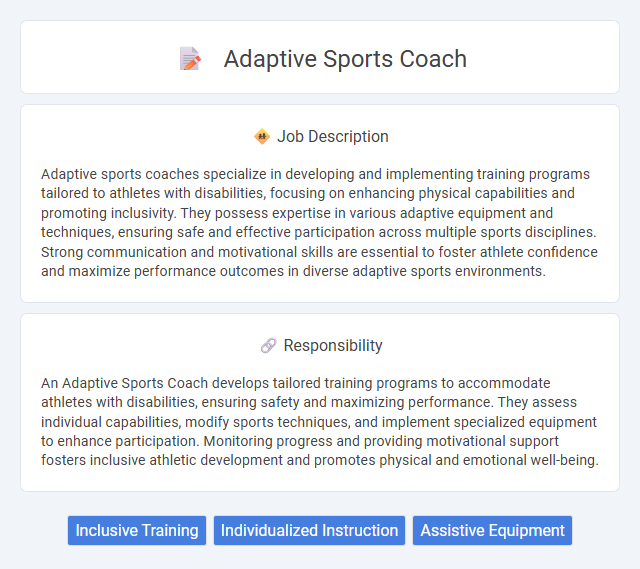
Adaptive sports coaches specialize in developing and implementing training programs tailored to athletes with disabilities, focusing on enhancing physical capabilities and promoting inclusivity. They possess expertise in various adaptive equipment and techniques, ensuring safe and effective participation across multiple sports disciplines. Strong communication and motivational skills are essential to foster athlete confidence and maximize performance outcomes in diverse adaptive sports environments.
Individuals with a strong passion for helping people with disabilities or special needs will likely find the role of an adaptive sports coach suitable. Those who possess patience, excellent communication skills, and a deep understanding of adaptive techniques may have a higher probability of success in this job. People with physical or mental limitations that hinder consistent interaction or demonstration of exercises might find this position less appropriate.
Qualification
An adaptive sports coach must possess specialized certification in adaptive physical education or rehabilitation fitness, along with experience in modifying sports techniques to accommodate athletes with disabilities. Proficiency in anatomy, kinesiology, and disability awareness is essential to create inclusive training programs that enhance athletic performance safely. Effective communication and empathy are critical skills for fostering motivation and trust within diverse athlete populations.
Responsibility
An Adaptive Sports Coach develops tailored training programs to accommodate athletes with disabilities, ensuring safety and maximizing performance. They assess individual capabilities, modify sports techniques, and implement specialized equipment to enhance participation. Monitoring progress and providing motivational support fosters inclusive athletic development and promotes physical and emotional well-being.
Benefit
Adaptive sports coaching likely offers significant benefits, including improving athletes' physical abilities and boosting their mental well-being. This role probably fosters a sense of community and inclusion by empowering individuals with disabilities to participate in sports. Coaches may also experience personal fulfillment from witnessing their athletes' progress and increased confidence.
Challenge
Adaptive sports coaches likely face unique challenges that require innovative problem-solving and personalized approaches to training. They probably need to continuously adapt techniques to accommodate varying physical abilities while fostering an inclusive team environment. Overcoming these obstacles might enhance both the coach's skills and the athletes' overall performance.
Career Advancement
An adaptive sports coach develops specialized training programs tailored to athletes with disabilities, enhancing their physical performance and overall well-being. Career advancement opportunities include roles such as senior coaching positions, program director, and sports rehabilitation specialist, often requiring additional certifications in adaptive physical education or therapeutic exercise. Networking within adaptive sports associations and continuing education in inclusive coaching techniques further boost professional growth and leadership potential.
Key Terms
Inclusive Training
Adaptive sports coaches specialize in inclusive training techniques that cater to athletes with disabilities, ensuring equitable access to physical activity and skill development. They design customized workout plans and use specialized equipment to accommodate various physical and cognitive needs, fostering a supportive environment for all participants. Expertise in communication strategies and disability awareness enhances their ability to motivate and empower athletes, promoting confidence and social inclusion through sport.
Individualized Instruction
Adaptive sports coaches specialize in providing individualized instruction tailored to athletes with diverse physical and cognitive abilities, ensuring personalized training plans that maximize performance and safety. They assess each athlete's unique needs, strengths, and goals to develop customized techniques and modifications that enhance skill development and confidence. Expertise in adaptive equipment and inclusive coaching strategies enables these professionals to foster a supportive environment that promotes athletic growth and overall well-being.
Assistive Equipment
An adaptive sports coach specializes in using assistive equipment to enable athletes with disabilities to participate safely and effectively in various sports. They must have in-depth knowledge of customized wheelchairs, prosthetics, and specialized sensors to enhance performance and ensure accessibility. Proper training in the selection, adjustment, and maintenance of assistive devices is crucial to maximize athletes' mobility and reduce injury risks.
 kuljobs.com
kuljobs.com